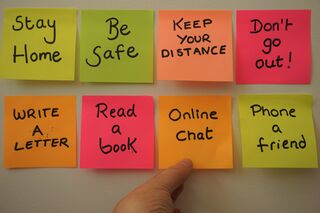Coronavirus Disease 2019
Why We Should Not Expect to Be "Normal" Again
Understanding why COVID-19 has changed us forever, even after a vaccine.
Posted December 4, 2020 Reviewed by Matt Huston

I keep hearing myself and others say, "when we get back to life as 'normal.'" I can't wait to hug my friends, to sit together for a meal, to be inside together, travel abroad, and maybe even race in a triathlon again.
However, my training as a psychotherapist reminds me that in many ways, "normal" is dead. This was also affirmed this morning by The New York Times, where the results of a survey of 700 epidemiologists were published.1 A direct quote from this article: "Mental health care will continue to be essential,” said Daniel Vader, a postdoctoral researcher at the University of Pennsylvania. “This is a traumatic time, and many of us will be affected by the worry and grief it has induced for the rest of our lives.”
There are things in our lives that are so indelibly changed that we will never be the same. For example, I remember when I lost my brother-in-law to a genetic condition at the young age of 35 years, when he had three children under the age of 5. I would never be the same. And yes, the family still gathered, and yes, my life carried on—but I was never to be the same again. (For more on my personal experience with this and a theoretical understanding of it, you can take a look at a book that I co-authored with Daryl Van Tongeren.2)
The desire to be "normal" pervades the practice of psychology. To the point that if people differ from "normal" they have the potential to fall into the realms of diagnosis. It is important that we let go of those antiquated ways of understanding and instead learn about what our experience is teaching us. Most problems and difficulties that we have as humans circle around our difficulties with accepting reality and instead clinging to certainty, expectations, and knowing.
I foresee a looming mental health crisis when we all return to "normal" and no one feels like we once did. We may carry in our bodies the effects of this collective experience of a worldwide pandemic for the rest of our lives. Begin to notice what your body does, even now. Our job is not to judge it, but rather to understand why our bodies may be telling us we are in danger and may not feel "normal" when we are safe again. Instead of pathologizing these feelings, take these steps:
- Start with the uncertainty principle3: We do not know everything—and in fact, there are some things we cannot know. If we can start from this place, we can begin from a place of compassion, a place of love, and a place of curiosity that exists without judgment.
- Listen to your body: This is an "easy" step that many of us have come to believe is irrelevant. I would like to challenge that and remind you that our body is our power. It has evolved to help us know when we are in danger. We cannot begin to make sense of our surroundings if we are in an activated response. First, we must listen to our body and its signals before we proceed—and because we are doing it and holding fast to the uncertainty principle, we can listen and understand what is being told to us.
- Acknowledge where you are now: Part of the difficulty of all of this is we are meaning makers. We tend to make meaning out of almost everything. That also includes things that are just random. Take a moment and say to yourself the reality of the situation. Even whisper it out loud. State just the facts. For example, I could say about the loss of my brother-in-law, "My brother-in-law has died due to a genetic condition. I am deeply sad and scared."
- Pay attention to your self-talk: We can integrate society and culture into the ways we see ourselves. Often this can be from a harsh perspective when we do not fit the expectation of "normal." Begin by asking yourself where you received the messages of normal in the first place. In my case, I initially felt the need to care for others because "their pain is worse than my pain." That message I had received many, many times through culture. "Be grateful because someone always has it worse." What if I changed this to actually be compassionate to myself? What would I tell a friend? Starting by telling myself the same thing I would tell my friend. No judgment, just compassion. Something like, "of course you are sad—you are grieving."
- Allow yourself to adapt as you are—not as you WANT to be: When you start to come around to the reality of where you are and what you are feeling, you can begin to integrate yourself into the present moment. Do this without judgment. The reality may hurt, the reality may not be something you want—but you are now present with it, and that can be the first step toward normalizing our new reality.
Please consider posting a picture that represents your new "normal" and tag @theexistentialtherapist and @psych_today on Instagram. We would love to see what you learn about yourself along the way.
References
1. Sanger-Katz, M., Cain Miller, C., & Bui, Q. (2020, December 4). How 700 Epidemiologists Are Living Now, and What They Think Is Next. The New York Times. Retrieved December 4, 2020.
2. Van Tongeren, D. R. & Van Tongeren, S. A. S. (2020). The Courage To Suffer: a new clinical framework for life's greatest crises. West Conshohocken, PA: Templeton Press.
3. Grand, D. (2014). Brainspotting: The Revolutionary New Therapy for Rapid and Effective Change. Sounds True.


